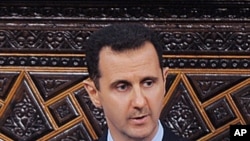The United States says is it considering if war crimes charges can be brought against Syria's president as part of a larger diplomatic effort to get his government to end its crackdown on dissent.
In a telephone conference with reporters Friday, two senior White House officials said the U.S. is also considering economic sanctions against Syria's oil and gas sectors.
The officials said the U.S. is stepping up efforts with its allies as well as regional opposition figures to put pressure Syria's President Bashar al-Assad.
In a column in the pan-Arab daily newspaper Asharq Al-Awsat, U.S. Secretary of State Hillary Clinton said that with his crackdown, Assad is "placing himself and his regime on the wrong side of history." She said Syria's brutality against its people has "shattered his claims to be a reformer."
Clinton also spoke with her Russian counterpart trying to get Russia on board with a U.N. Security Council resolution condemning the violence against protesters. Russia and China have so far opposed efforts to draft a resolution.
The diplomatic wrangling comes as Syrian security forces Friday shot and killed at least 18 more anti-government protesters. Activists and witnesses say security forces used live ammunition against protesters who poured into the streets with renewed calls for President Assad's resignation.
Western news reports say at least five of the deaths occurred in the flashpoint city of Homs and two in the eastern town of Deir el-Zour. At least one teenager is among those killed.
Anti-government rallies were also under way in other cities, including Daraa, Latakia and near the capital, Damascus.
The unrest spilled over into neighboring Lebanon on Friday, where two people were killed following a protest against Assad's government. Residents from a Sunni Muslim neighborhood in the city of Tripoli clashed with those from a neighborhood inhabited by members of the Shi'ite Alawite sect. Assad's family is part of the sect.
Earlier Friday, security forces mounted new assaults in the country's restive northwest, sending tanks and troops into two more cities.
Rights activists and witnesses say the military sent large numbers of soldiers into Maaret al-Numaan, a city that is on the highway linking the capital and the large city of Aleppo. In addition, the security forces moved into the town of Khan Sheikhun.
Meanwhile, Turkish officials say the number of Syrians who have crossed the border to flee from the unrest is nearing 10,000.
The al-Jazeera television network said Friday that some Syrians who have gathered near the Turkish border also demonstrated against President Assad.
World powers are increasingly condemning the crackdown. On Friday, French officials voiced support for additional European Union sanctions on President Assad's government.
On Thursday, U.N. Secretary-General Ban Ki-moon called on the Syrian president to "stop killing people" and negotiate with the protesters "before it's too late."
Rights activists and witnesses say more than 1,300 civilians and 340 government troops have been killed since mid-March.
Some information for this report was provided by AFP and Reuters.




